 Angola is a nation still recovering from years of war and internal conflict, but photographer Kim Praise has his heart set on capturing the nation’s beauty, and the ways in which it’s evolving for the better. He tells writer Ify Obi about his favorite things about his home, and why he’s determined to paint the country—and its people—in a new light.
Angola is a nation still recovering from years of war and internal conflict, but photographer Kim Praise has his heart set on capturing the nation’s beauty, and the ways in which it’s evolving for the better. He tells writer Ify Obi about his favorite things about his home, and why he’s determined to paint the country—and its people—in a new light.
To read
12.10.2022 | by Ify Obi
 During their years at war, thousands of the young recruits sent to Angola, Guinea-Bissau and Mozambique took photos of what surrounded them: their comrades, barracks, landscapes, daily life, the civilian population, and the military apparatus. These images managed to evade the censorship of the regime, and were stored away or sent by mail as proof of their distant lives.
Some of these men built improvised darkrooms, others managed to access official ones. Many visited photography shops that flourished as a consequence of the demand generated by the war, and many bought and exchanged images. All this created the photographic archives of which we here present a part.
During their years at war, thousands of the young recruits sent to Angola, Guinea-Bissau and Mozambique took photos of what surrounded them: their comrades, barracks, landscapes, daily life, the civilian population, and the military apparatus. These images managed to evade the censorship of the regime, and were stored away or sent by mail as proof of their distant lives.
Some of these men built improvised darkrooms, others managed to access official ones. Many visited photography shops that flourished as a consequence of the demand generated by the war, and many bought and exchanged images. All this created the photographic archives of which we here present a part.
I'll visit
05.01.2022 | by Inês Ponte and Maria José Lobo Antunes
 With a work markedly attentive to the rhythms and faces, the materials and constructions, the urban surfaces and textures – in particular, of Luanda, its slums or musseques and its islands –, from an early age Ole also observed that other Angola so dissimilar from the capital, its diverse landscapes and ways of life. António Ole: Vital Matter unveils, precisely, some of these other rhythms and textures, the vital matters beyond the walls and the skin of the city.
With a work markedly attentive to the rhythms and faces, the materials and constructions, the urban surfaces and textures – in particular, of Luanda, its slums or musseques and its islands –, from an early age Ole also observed that other Angola so dissimilar from the capital, its diverse landscapes and ways of life. António Ole: Vital Matter unveils, precisely, some of these other rhythms and textures, the vital matters beyond the walls and the skin of the city.
I'll visit
14.04.2021 | by Ana Balona de Oliveira
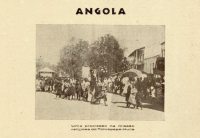 References to Portugal’s epic, seafaring past like these litter this city – there is even a Vasco da Gama shopping mall. But until now, there has never been a single explicit reference, memorial or monument in Portugal’s public space to its pioneering role in the transatlantic slave trade, nor any acknowledgement of the millions of lives that were stolen between the 15th and 19th centuries.
References to Portugal’s epic, seafaring past like these litter this city – there is even a Vasco da Gama shopping mall. But until now, there has never been a single explicit reference, memorial or monument in Portugal’s public space to its pioneering role in the transatlantic slave trade, nor any acknowledgement of the millions of lives that were stolen between the 15th and 19th centuries.
Games Without Borders
15.03.2021 | by Ana Naomi de Sousa
 Yonamine has theatrically composed the gallery walls with posters made out of a selection of articles from Zimbabwean newspapers, paintings and video animations, showing several graphic references of power such as Napoleon figure and the Ku Kux Klan uniform presented in a navy blue adulterated version colour that evokes the uniforms of Zimbabwe's workers. All these elements are presented as political propaganda in the eve of an election, personifying the conqueror's evil thirst to reach power and control by keeping the opposition voiceless.
Yonamine has theatrically composed the gallery walls with posters made out of a selection of articles from Zimbabwean newspapers, paintings and video animations, showing several graphic references of power such as Napoleon figure and the Ku Kux Klan uniform presented in a navy blue adulterated version colour that evokes the uniforms of Zimbabwe's workers. All these elements are presented as political propaganda in the eve of an election, personifying the conqueror's evil thirst to reach power and control by keeping the opposition voiceless.
I'll visit
26.08.2019 | by Cécile Bourne-Farrell
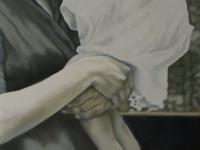 Some of these stories also show that such ‘returns’ to Angola by people of Nuno’s generation may actually be critical detours, when they give rise, upon returning to Portugal, to critical postures on the colonial persistence within Portuguese society. In this European context, could the Portuguese case represent an alternative: something that, through a post-colonial journey, may lead to a more egalitarian society that accepts a plural public retelling of the past?
Some of these stories also show that such ‘returns’ to Angola by people of Nuno’s generation may actually be critical detours, when they give rise, upon returning to Portugal, to critical postures on the colonial persistence within Portuguese society. In this European context, could the Portuguese case represent an alternative: something that, through a post-colonial journey, may lead to a more egalitarian society that accepts a plural public retelling of the past?
To read
29.07.2019 | by Irène dos Santos
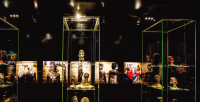 The discussion about the restitution of ethnographic works – be them artistic, documental or human remains – to the countries of origin is not new, but regained prominence two weeks ago with the announcement of Emmanuel Macron’s decision to return a bronze collection to Benin, from where the artworks were taken at the end of the 19th century in a punitive military expedition against the kingdoms of west Africa.
The discussion about the restitution of ethnographic works – be them artistic, documental or human remains – to the countries of origin is not new, but regained prominence two weeks ago with the announcement of Emmanuel Macron’s decision to return a bronze collection to Benin, from where the artworks were taken at the end of the 19th century in a punitive military expedition against the kingdoms of west Africa.
To read
29.12.2018 | by vários
 By systematically deconstructing the travel logs and journals of European explorers, scientists and traders who wandered through tropical Africa in the late 19th century, proves that these documents were often idealized or inaccurate and that, most of the time, these Europeans were in a permanent state of ecstasy caused by the disease, high doses of quinine, alcohol, opiates and other drugs.
By systematically deconstructing the travel logs and journals of European explorers, scientists and traders who wandered through tropical Africa in the late 19th century, proves that these documents were often idealized or inaccurate and that, most of the time, these Europeans were in a permanent state of ecstasy caused by the disease, high doses of quinine, alcohol, opiates and other drugs.
Afroscreen
14.03.2016 | by António Pinto Ribeiro
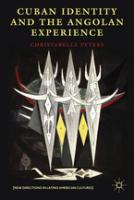 November 5, 1975 marked the 132nd year anniversary of the slave rebellion at the Triumvirato sugar plantation in Matanzas province, led by an enslaved African woman named Carlota. As one of the first acts in her liberation campaign, Carlota, accompanied by her captains, made her way to another plantation, Arcana, where a number of co-conspirators were being held in captivity following an uprising there in August of that year’s incendiary summer, when Africans and their descendants rose up against their enslavers throughout the province. As word spread of Carlota’s successes, one estate after another erupted in insurrection—San Miguel, Concepción, San Lorenzo, and San Rafael.
November 5, 1975 marked the 132nd year anniversary of the slave rebellion at the Triumvirato sugar plantation in Matanzas province, led by an enslaved African woman named Carlota. As one of the first acts in her liberation campaign, Carlota, accompanied by her captains, made her way to another plantation, Arcana, where a number of co-conspirators were being held in captivity following an uprising there in August of that year’s incendiary summer, when Africans and their descendants rose up against their enslavers throughout the province. As word spread of Carlota’s successes, one estate after another erupted in insurrection—San Miguel, Concepción, San Lorenzo, and San Rafael.
To read
15.11.2015 | by Christabelle Peters
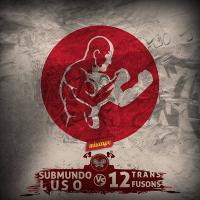 “Submundo Luso vs 12transfusons” is a new mix tape that features rappers from Angola, Mozambique, Brazil and Portugal. Released on New Year’s Eve after five months of preparation, the project brought together hip-hop promoters from the blogs Submundo Luso [pt] in Mozambique and 12transfusons [pt] in Angola. The two met online and the former invited the latter to collaborate.
In this interview for the blog Underground Lusófono [pt], Astérix o Néfilim (Astérix the Giant, in English), a rapper, producer and manager at 12transfusons, talks about the effort, which counted the participation of artists from all over the globe and is now available as a free download. He also shares his views on the artistic scene in Cabinda – a tiny province in the north of Angola – and the challenges caused by such isolation.
“Submundo Luso vs 12transfusons” is a new mix tape that features rappers from Angola, Mozambique, Brazil and Portugal. Released on New Year’s Eve after five months of preparation, the project brought together hip-hop promoters from the blogs Submundo Luso [pt] in Mozambique and 12transfusons [pt] in Angola. The two met online and the former invited the latter to collaborate.
In this interview for the blog Underground Lusófono [pt], Astérix o Néfilim (Astérix the Giant, in English), a rapper, producer and manager at 12transfusons, talks about the effort, which counted the participation of artists from all over the globe and is now available as a free download. He also shares his views on the artistic scene in Cabinda – a tiny province in the north of Angola – and the challenges caused by such isolation.
Stages
28.01.2014 | by vários
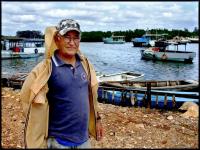 Carlos is the character I am most worried about. I’d only spent a few hours with him before, and I am not sure what he will reveal about his time in Angola and how that will fit into the film. He is a fisherman, his skin deeply tanned from a lifetime at sea.
Carlos is the character I am most worried about. I’d only spent a few hours with him before, and I am not sure what he will reveal about his time in Angola and how that will fit into the film. He is a fisherman, his skin deeply tanned from a lifetime at sea.
Afroscreen
01.10.2011 | by Dulce Fernandes
 When the Africans discovered that the mato inspired such horror in the Portuguese, they made it their habitual refuge, patiently negotiating from there with the intruders. Queen Njinga, in Angola, played this game to perfection, thus provoking the increasing anger of the Portuguese. Referring to the subterfuges the Portuguese governor opposed to the liberation of her sister, prisoner in Luanda, she wrote on 13 December 1655: “For these and other betrayals I took shelter in the matos, far from my territories” (Cadornega 1972, II: 501). By withdrawing to the forest, the queen was not only obeying a military imperative, but also putting pressure on the Portuguese.
When the Africans discovered that the mato inspired such horror in the Portuguese, they made it their habitual refuge, patiently negotiating from there with the intruders. Queen Njinga, in Angola, played this game to perfection, thus provoking the increasing anger of the Portuguese. Referring to the subterfuges the Portuguese governor opposed to the liberation of her sister, prisoner in Luanda, she wrote on 13 December 1655: “For these and other betrayals I took shelter in the matos, far from my territories” (Cadornega 1972, II: 501). By withdrawing to the forest, the queen was not only obeying a military imperative, but also putting pressure on the Portuguese.
To read
17.05.2011 | by Martín Lienhard
 Interview carried out by online chat, at various times and on various days, punctuated by continual breaks in the Internet connection that maps out the transatlantic and ex-colonial triangulation between Luanda, Angola – Kiluanji Kia Henda’s home, a city that I have never visited; São Paulo, Brazil – my temporary home and the place where I first met Kiluanji, a place that is close to the origin of the series presented here; Lisbon, Portugal – my permanent home, source of the schedule drawn up by my computer and Kiluanji’s ex-temporary home.
Interview carried out by online chat, at various times and on various days, punctuated by continual breaks in the Internet connection that maps out the transatlantic and ex-colonial triangulation between Luanda, Angola – Kiluanji Kia Henda’s home, a city that I have never visited; São Paulo, Brazil – my temporary home and the place where I first met Kiluanji, a place that is close to the origin of the series presented here; Lisbon, Portugal – my permanent home, source of the schedule drawn up by my computer and Kiluanji’s ex-temporary home.
Face to face
08.04.2011 | by Lígia Afonso
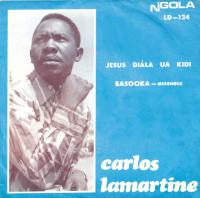 It’s 1943 and Benguela is thriving. As the famous railway heads inland, the town readies itself for a make-over: there is a modern development plan afoot. Progress is the watchword. In one of its streets, an important event is about to occur: Dona Ludovina (a singer of some style, they say), the wife of Sebastião José da Costa, an employee at the Post Office and a former journalist, is about to give birth to a child she will call Carlos Lamartine. Benguela waits, with open arms, to welcome a great son, one who will be a major figure in Angolan music and the author of timeless melodies.
It’s 1943 and Benguela is thriving. As the famous railway heads inland, the town readies itself for a make-over: there is a modern development plan afoot. Progress is the watchword. In one of its streets, an important event is about to occur: Dona Ludovina (a singer of some style, they say), the wife of Sebastião José da Costa, an employee at the Post Office and a former journalist, is about to give birth to a child she will call Carlos Lamartine. Benguela waits, with open arms, to welcome a great son, one who will be a major figure in Angolan music and the author of timeless melodies.
Stages
18.02.2011 | by Mário Rui Silva
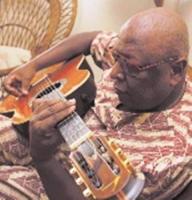 The saucepan lids turned like records on an imaginary pick-up. If you closed your eyes, you could hear the sounds reverberating everywhere. Then came the sessions when other rhythms were played - mornas and coladeras on the guitar of a cousin who “sort of lived in the house.” The gramophones and the radios had also been sort of living there for a long time. But that was at the start. Aftyer that there was going to be the Clube Marítimo Africano, the final year parties, the focus on a big new star and then recognition as a major figure in Angolan music: Filipe Zau.
The saucepan lids turned like records on an imaginary pick-up. If you closed your eyes, you could hear the sounds reverberating everywhere. Then came the sessions when other rhythms were played - mornas and coladeras on the guitar of a cousin who “sort of lived in the house.” The gramophones and the radios had also been sort of living there for a long time. But that was at the start. Aftyer that there was going to be the Clube Marítimo Africano, the final year parties, the focus on a big new star and then recognition as a major figure in Angolan music: Filipe Zau.
Stages
16.02.2011 | by Mário Rui Silva
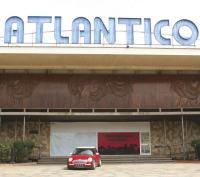 The cinemas in Angola are points of reference in the towns where they found a home. And there are many of them. It’s the kind of infrastructure that you find all over the country, because their heyday started way before independence, allowing the Portuguese colonial authorities to take entertainment – but especially regime propaganda – all over the country. What remains for the telling are the architectural lines, the pleasure for shows and multi-purpose spaces.
The cinemas in Angola are points of reference in the towns where they found a home. And there are many of them. It’s the kind of infrastructure that you find all over the country, because their heyday started way before independence, allowing the Portuguese colonial authorities to take entertainment – but especially regime propaganda – all over the country. What remains for the telling are the architectural lines, the pleasure for shows and multi-purpose spaces.
City
13.12.2010 | by Miguel Gomes
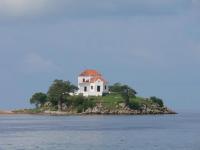 The triangular trade relationship liking Africa and Europe is well known. The “dark continent” supplied the slave labour that America needed, and indeed contributed to its growth, expansion and development. Slave labour also fed into European commercial interests, also generating economic, social, technological, cultural and other development. It is an issue which had repercussions in the relationship between the three continents and its consequences are still the subject of debate, as demographic studies illustrate.
The triangular trade relationship liking Africa and Europe is well known. The “dark continent” supplied the slave labour that America needed, and indeed contributed to its growth, expansion and development. Slave labour also fed into European commercial interests, also generating economic, social, technological, cultural and other development. It is an issue which had repercussions in the relationship between the three continents and its consequences are still the subject of debate, as demographic studies illustrate.
To read
29.11.2010 | by Aurora da Fonseca Ferreira
 Vast Namibe is a beautiful book of photographs by Jorge Ferreira “on landscapes, people, animals and plants in the province of Namibe” with text and captions by Cristina U. Rodrigues and graphic design of João Ribeiro Soares.
Vast Namibe is a beautiful book of photographs by Jorge Ferreira “on landscapes, people, animals and plants in the province of Namibe” with text and captions by Cristina U. Rodrigues and graphic design of João Ribeiro Soares.
Ruy Duarte de Carvalho
25.11.2010 | by Cristina Salvador
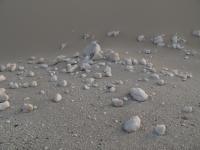 I can say, perhaps, that this trip has increased our awareness of the uncontrollable aspects of nature (the Icelandic volcano has now served notice to the oblivious) and revealed to us the existence of populations that are able to combine complex social organization and ownership of simple natural resources, which can only be the result of their deep knowledge of the territory.
I can say, perhaps, that this trip has increased our awareness of the uncontrollable aspects of nature (the Icelandic volcano has now served notice to the oblivious) and revealed to us the existence of populations that are able to combine complex social organization and ownership of simple natural resources, which can only be the result of their deep knowledge of the territory.
To read
22.09.2010 | by Cristina Salvador
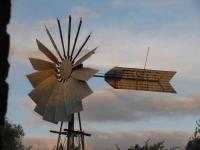 And I believe, having arrived at this point in life, that I can’t stop wanting to understand that the world, all over and not just here, conspires and produces utilizing always, or almost always, the use and abuse of others’ good faith. I’m afraid I will never be able, even oldish, to resign to this and become the subject well done, dissimulated, pirate, adaptable and finally adapted, that never, throughout my entire life, have I managed to be.
And I believe, having arrived at this point in life, that I can’t stop wanting to understand that the world, all over and not just here, conspires and produces utilizing always, or almost always, the use and abuse of others’ good faith. I’m afraid I will never be able, even oldish, to resign to this and become the subject well done, dissimulated, pirate, adaptable and finally adapted, that never, throughout my entire life, have I managed to be.
Ruy Duarte de Carvalho
31.08.2010 | by Ruy Duarte de Carvalho
 Angola is a nation still recovering from years of war and internal conflict, but photographer Kim Praise has his heart set on capturing the nation’s beauty, and the ways in which it’s evolving for the better. He tells writer Ify Obi about his favorite things about his home, and why he’s determined to paint the country—and its people—in a new light.
Angola is a nation still recovering from years of war and internal conflict, but photographer Kim Praise has his heart set on capturing the nation’s beauty, and the ways in which it’s evolving for the better. He tells writer Ify Obi about his favorite things about his home, and why he’s determined to paint the country—and its people—in a new light.  During their years at war, thousands of the young recruits sent to Angola, Guinea-Bissau and Mozambique took photos of what surrounded them: their comrades, barracks, landscapes, daily life, the civilian population, and the military apparatus. These images managed to evade the censorship of the regime, and were stored away or sent by mail as proof of their distant lives.
Some of these men built improvised darkrooms, others managed to access official ones. Many visited photography shops that flourished as a consequence of the demand generated by the war, and many bought and exchanged images. All this created the photographic archives of which we here present a part.
During their years at war, thousands of the young recruits sent to Angola, Guinea-Bissau and Mozambique took photos of what surrounded them: their comrades, barracks, landscapes, daily life, the civilian population, and the military apparatus. These images managed to evade the censorship of the regime, and were stored away or sent by mail as proof of their distant lives.
Some of these men built improvised darkrooms, others managed to access official ones. Many visited photography shops that flourished as a consequence of the demand generated by the war, and many bought and exchanged images. All this created the photographic archives of which we here present a part.  With a work markedly attentive to the rhythms and faces, the materials and constructions, the urban surfaces and textures – in particular, of Luanda, its slums or musseques and its islands –, from an early age Ole also observed that other Angola so dissimilar from the capital, its diverse landscapes and ways of life. António Ole: Vital Matter unveils, precisely, some of these other rhythms and textures, the vital matters beyond the walls and the skin of the city.
With a work markedly attentive to the rhythms and faces, the materials and constructions, the urban surfaces and textures – in particular, of Luanda, its slums or musseques and its islands –, from an early age Ole also observed that other Angola so dissimilar from the capital, its diverse landscapes and ways of life. António Ole: Vital Matter unveils, precisely, some of these other rhythms and textures, the vital matters beyond the walls and the skin of the city.  References to Portugal’s epic, seafaring past like these litter this city – there is even a Vasco da Gama shopping mall. But until now, there has never been a single explicit reference, memorial or monument in Portugal’s public space to its pioneering role in the transatlantic slave trade, nor any acknowledgement of the millions of lives that were stolen between the 15th and 19th centuries.
References to Portugal’s epic, seafaring past like these litter this city – there is even a Vasco da Gama shopping mall. But until now, there has never been a single explicit reference, memorial or monument in Portugal’s public space to its pioneering role in the transatlantic slave trade, nor any acknowledgement of the millions of lives that were stolen between the 15th and 19th centuries.  Yonamine has theatrically composed the gallery walls with posters made out of a selection of articles from Zimbabwean newspapers, paintings and video animations, showing several graphic references of power such as Napoleon figure and the Ku Kux Klan uniform presented in a navy blue adulterated version colour that evokes the uniforms of Zimbabwe's workers. All these elements are presented as political propaganda in the eve of an election, personifying the conqueror's evil thirst to reach power and control by keeping the opposition voiceless.
Yonamine has theatrically composed the gallery walls with posters made out of a selection of articles from Zimbabwean newspapers, paintings and video animations, showing several graphic references of power such as Napoleon figure and the Ku Kux Klan uniform presented in a navy blue adulterated version colour that evokes the uniforms of Zimbabwe's workers. All these elements are presented as political propaganda in the eve of an election, personifying the conqueror's evil thirst to reach power and control by keeping the opposition voiceless.  Some of these stories also show that such ‘returns’ to Angola by people of Nuno’s generation may actually be critical detours, when they give rise, upon returning to Portugal, to critical postures on the colonial persistence within Portuguese society. In this European context, could the Portuguese case represent an alternative: something that, through a post-colonial journey, may lead to a more egalitarian society that accepts a plural public retelling of the past?
Some of these stories also show that such ‘returns’ to Angola by people of Nuno’s generation may actually be critical detours, when they give rise, upon returning to Portugal, to critical postures on the colonial persistence within Portuguese society. In this European context, could the Portuguese case represent an alternative: something that, through a post-colonial journey, may lead to a more egalitarian society that accepts a plural public retelling of the past?  The discussion about the restitution of ethnographic works – be them artistic, documental or human remains – to the countries of origin is not new, but regained prominence two weeks ago with the announcement of Emmanuel Macron’s decision to return a bronze collection to Benin, from where the artworks were taken at the end of the 19th century in a punitive military expedition against the kingdoms of west Africa.
The discussion about the restitution of ethnographic works – be them artistic, documental or human remains – to the countries of origin is not new, but regained prominence two weeks ago with the announcement of Emmanuel Macron’s decision to return a bronze collection to Benin, from where the artworks were taken at the end of the 19th century in a punitive military expedition against the kingdoms of west Africa.  By systematically deconstructing the travel logs and journals of European explorers, scientists and traders who wandered through tropical Africa in the late 19th century, proves that these documents were often idealized or inaccurate and that, most of the time, these Europeans were in a permanent state of ecstasy caused by the disease, high doses of quinine, alcohol, opiates and other drugs.
By systematically deconstructing the travel logs and journals of European explorers, scientists and traders who wandered through tropical Africa in the late 19th century, proves that these documents were often idealized or inaccurate and that, most of the time, these Europeans were in a permanent state of ecstasy caused by the disease, high doses of quinine, alcohol, opiates and other drugs.  November 5, 1975 marked the 132nd year anniversary of the slave rebellion at the Triumvirato sugar plantation in Matanzas province, led by an enslaved African woman named Carlota. As one of the first acts in her liberation campaign, Carlota, accompanied by her captains, made her way to another plantation, Arcana, where a number of co-conspirators were being held in captivity following an uprising there in August of that year’s incendiary summer, when Africans and their descendants rose up against their enslavers throughout the province. As word spread of Carlota’s successes, one estate after another erupted in insurrection—San Miguel, Concepción, San Lorenzo, and San Rafael.
November 5, 1975 marked the 132nd year anniversary of the slave rebellion at the Triumvirato sugar plantation in Matanzas province, led by an enslaved African woman named Carlota. As one of the first acts in her liberation campaign, Carlota, accompanied by her captains, made her way to another plantation, Arcana, where a number of co-conspirators were being held in captivity following an uprising there in August of that year’s incendiary summer, when Africans and their descendants rose up against their enslavers throughout the province. As word spread of Carlota’s successes, one estate after another erupted in insurrection—San Miguel, Concepción, San Lorenzo, and San Rafael.  “Submundo Luso vs 12transfusons” is a new mix tape that features rappers from Angola, Mozambique, Brazil and Portugal. Released on New Year’s Eve after five months of preparation, the project brought together hip-hop promoters from the blogs Submundo Luso [pt] in Mozambique and 12transfusons [pt] in Angola. The two met online and the former invited the latter to collaborate.
In this interview for the blog Underground Lusófono [pt], Astérix o Néfilim (Astérix the Giant, in English), a rapper, producer and manager at 12transfusons, talks about the effort, which counted the participation of artists from all over the globe and is now available as a free download. He also shares his views on the artistic scene in Cabinda – a tiny province in the north of Angola – and the challenges caused by such isolation.
“Submundo Luso vs 12transfusons” is a new mix tape that features rappers from Angola, Mozambique, Brazil and Portugal. Released on New Year’s Eve after five months of preparation, the project brought together hip-hop promoters from the blogs Submundo Luso [pt] in Mozambique and 12transfusons [pt] in Angola. The two met online and the former invited the latter to collaborate.
In this interview for the blog Underground Lusófono [pt], Astérix o Néfilim (Astérix the Giant, in English), a rapper, producer and manager at 12transfusons, talks about the effort, which counted the participation of artists from all over the globe and is now available as a free download. He also shares his views on the artistic scene in Cabinda – a tiny province in the north of Angola – and the challenges caused by such isolation.  Carlos is the character I am most worried about. I’d only spent a few hours with him before, and I am not sure what he will reveal about his time in Angola and how that will fit into the film. He is a fisherman, his skin deeply tanned from a lifetime at sea.
Carlos is the character I am most worried about. I’d only spent a few hours with him before, and I am not sure what he will reveal about his time in Angola and how that will fit into the film. He is a fisherman, his skin deeply tanned from a lifetime at sea.  When the Africans discovered that the mato inspired such horror in the Portuguese, they made it their habitual refuge, patiently negotiating from there with the intruders. Queen Njinga, in Angola, played this game to perfection, thus provoking the increasing anger of the Portuguese. Referring to the subterfuges the Portuguese governor opposed to the liberation of her sister, prisoner in Luanda, she wrote on 13 December 1655: “For these and other betrayals I took shelter in the matos, far from my territories” (Cadornega 1972, II: 501). By withdrawing to the forest, the queen was not only obeying a military imperative, but also putting pressure on the Portuguese.
When the Africans discovered that the mato inspired such horror in the Portuguese, they made it their habitual refuge, patiently negotiating from there with the intruders. Queen Njinga, in Angola, played this game to perfection, thus provoking the increasing anger of the Portuguese. Referring to the subterfuges the Portuguese governor opposed to the liberation of her sister, prisoner in Luanda, she wrote on 13 December 1655: “For these and other betrayals I took shelter in the matos, far from my territories” (Cadornega 1972, II: 501). By withdrawing to the forest, the queen was not only obeying a military imperative, but also putting pressure on the Portuguese.  Interview carried out by online chat, at various times and on various days, punctuated by continual breaks in the Internet connection that maps out the transatlantic and ex-colonial triangulation between Luanda, Angola – Kiluanji Kia Henda’s home, a city that I have never visited; São Paulo, Brazil – my temporary home and the place where I first met Kiluanji, a place that is close to the origin of the series presented here; Lisbon, Portugal – my permanent home, source of the schedule drawn up by my computer and Kiluanji’s ex-temporary home.
Interview carried out by online chat, at various times and on various days, punctuated by continual breaks in the Internet connection that maps out the transatlantic and ex-colonial triangulation between Luanda, Angola – Kiluanji Kia Henda’s home, a city that I have never visited; São Paulo, Brazil – my temporary home and the place where I first met Kiluanji, a place that is close to the origin of the series presented here; Lisbon, Portugal – my permanent home, source of the schedule drawn up by my computer and Kiluanji’s ex-temporary home.  It’s 1943 and Benguela is thriving. As the famous railway heads inland, the town readies itself for a make-over: there is a modern development plan afoot. Progress is the watchword. In one of its streets, an important event is about to occur: Dona Ludovina (a singer of some style, they say), the wife of Sebastião José da Costa, an employee at the Post Office and a former journalist, is about to give birth to a child she will call Carlos Lamartine. Benguela waits, with open arms, to welcome a great son, one who will be a major figure in Angolan music and the author of timeless melodies.
It’s 1943 and Benguela is thriving. As the famous railway heads inland, the town readies itself for a make-over: there is a modern development plan afoot. Progress is the watchword. In one of its streets, an important event is about to occur: Dona Ludovina (a singer of some style, they say), the wife of Sebastião José da Costa, an employee at the Post Office and a former journalist, is about to give birth to a child she will call Carlos Lamartine. Benguela waits, with open arms, to welcome a great son, one who will be a major figure in Angolan music and the author of timeless melodies.  The saucepan lids turned like records on an imaginary pick-up. If you closed your eyes, you could hear the sounds reverberating everywhere. Then came the sessions when other rhythms were played - mornas and coladeras on the guitar of a cousin who “sort of lived in the house.” The gramophones and the radios had also been sort of living there for a long time. But that was at the start. Aftyer that there was going to be the Clube Marítimo Africano, the final year parties, the focus on a big new star and then recognition as a major figure in Angolan music: Filipe Zau.
The saucepan lids turned like records on an imaginary pick-up. If you closed your eyes, you could hear the sounds reverberating everywhere. Then came the sessions when other rhythms were played - mornas and coladeras on the guitar of a cousin who “sort of lived in the house.” The gramophones and the radios had also been sort of living there for a long time. But that was at the start. Aftyer that there was going to be the Clube Marítimo Africano, the final year parties, the focus on a big new star and then recognition as a major figure in Angolan music: Filipe Zau.  The cinemas in Angola are points of reference in the towns where they found a home. And there are many of them. It’s the kind of infrastructure that you find all over the country, because their heyday started way before independence, allowing the Portuguese colonial authorities to take entertainment – but especially regime propaganda – all over the country. What remains for the telling are the architectural lines, the pleasure for shows and multi-purpose spaces.
The cinemas in Angola are points of reference in the towns where they found a home. And there are many of them. It’s the kind of infrastructure that you find all over the country, because their heyday started way before independence, allowing the Portuguese colonial authorities to take entertainment – but especially regime propaganda – all over the country. What remains for the telling are the architectural lines, the pleasure for shows and multi-purpose spaces.  The triangular trade relationship liking Africa and Europe is well known. The “dark continent” supplied the slave labour that America needed, and indeed contributed to its growth, expansion and development. Slave labour also fed into European commercial interests, also generating economic, social, technological, cultural and other development. It is an issue which had repercussions in the relationship between the three continents and its consequences are still the subject of debate, as demographic studies illustrate.
The triangular trade relationship liking Africa and Europe is well known. The “dark continent” supplied the slave labour that America needed, and indeed contributed to its growth, expansion and development. Slave labour also fed into European commercial interests, also generating economic, social, technological, cultural and other development. It is an issue which had repercussions in the relationship between the three continents and its consequences are still the subject of debate, as demographic studies illustrate.  Vast Namibe is a beautiful book of photographs by Jorge Ferreira “on landscapes, people, animals and plants in the province of Namibe” with text and captions by Cristina U. Rodrigues and graphic design of João Ribeiro Soares.
Vast Namibe is a beautiful book of photographs by Jorge Ferreira “on landscapes, people, animals and plants in the province of Namibe” with text and captions by Cristina U. Rodrigues and graphic design of João Ribeiro Soares.  I can say, perhaps, that this trip has increased our awareness of the uncontrollable aspects of nature (the Icelandic volcano has now served notice to the oblivious) and revealed to us the existence of populations that are able to combine complex social organization and ownership of simple natural resources, which can only be the result of their deep knowledge of the territory.
I can say, perhaps, that this trip has increased our awareness of the uncontrollable aspects of nature (the Icelandic volcano has now served notice to the oblivious) and revealed to us the existence of populations that are able to combine complex social organization and ownership of simple natural resources, which can only be the result of their deep knowledge of the territory.  And I believe, having arrived at this point in life, that I can’t stop wanting to understand that the world, all over and not just here, conspires and produces utilizing always, or almost always, the use and abuse of others’ good faith. I’m afraid I will never be able, even oldish, to resign to this and become the subject well done, dissimulated, pirate, adaptable and finally adapted, that never, throughout my entire life, have I managed to be.
And I believe, having arrived at this point in life, that I can’t stop wanting to understand that the world, all over and not just here, conspires and produces utilizing always, or almost always, the use and abuse of others’ good faith. I’m afraid I will never be able, even oldish, to resign to this and become the subject well done, dissimulated, pirate, adaptable and finally adapted, that never, throughout my entire life, have I managed to be. 